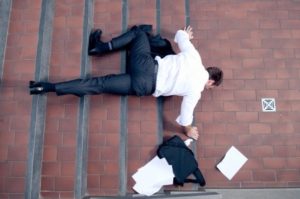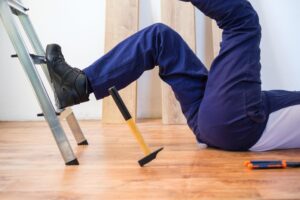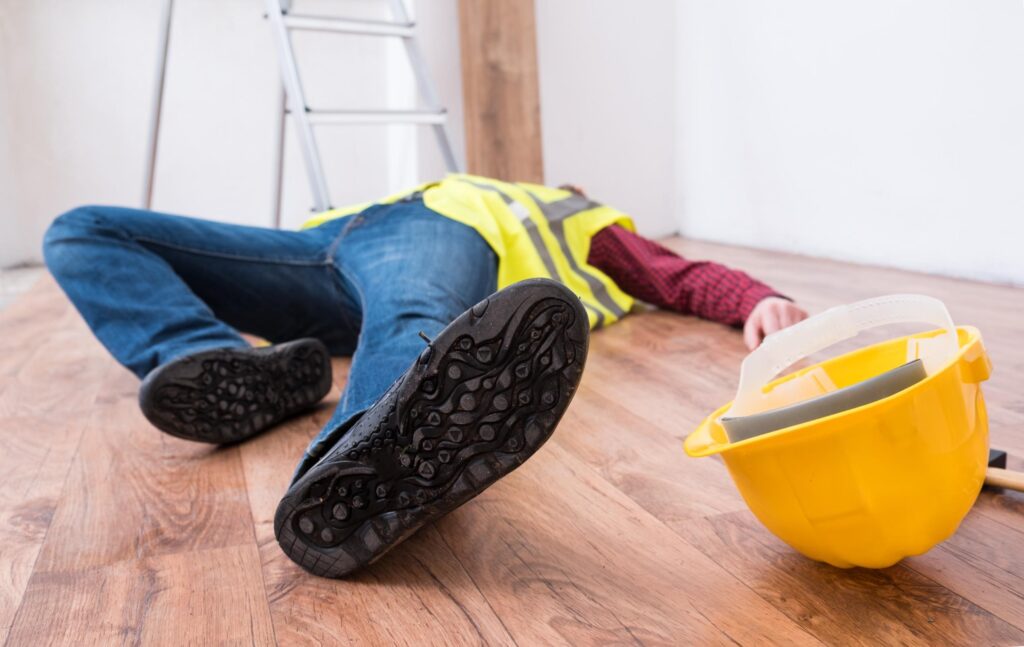By Stephen Bishop. Last Updated 9th April 2024. You may be wondering if you can claim compensation if you’ve experienced injuries due to a slip, trip and fall that wasn’t your fault. In some cases, a personal injury claim could be a justifiable course of action. In this comprehensive guide, we explain slip, trip and fall claims and how our panel of No Win No Fee solicitors can help you.
If you’d like to make a claim today, you can reach out for free. We’ll discuss your case with you and advise you on your legal options. You can get in touch by:
- Calling us for free legal advice at 0161 696 9685
- Using the live chat feature on this page
- Filling out our online form
Below, you can learn more about the types of trip and falls you can claim compensation for, the average compensation payout for a fall, and how a No Win No Fee agreement can help you.
Jump to a Section
- The Criteria For Slip, Trip Or Fall Claims
- How Common Are Slip, Trip And Fall Accidents?
- What Evidence Do I Need To Prove A Slip, Trip Or Fall Claim?
- The Average Payout For A Slip, Trip Or Fall Claims
- Make A Claim With No Win No Fee Solicitors
The Criteria For Slip, Trip Or Fall Claims
In order to make a slip, trip, or fall claim, you need to make sure that your case fits the relevant criteria. This means that you need to be able to establish that negligence occurs, which means:
- You were owed a duty of care.
- This duty was breached.
- As a result, you were injured.
A duty of care is a legal responsibility for someone else’s safety. Who owes you a duty of care can depend on where you are, and what you’re doing.
For example, when you’re at work, your employer owes you a duty of care under the Health and Safety at Work etc. Act 1974 (HASAWA). This means they are responsible for your safety working, and should take reasonable steps like risk assessments, providing training when necessary, and providing free and adequate personal protective equipment (PPE) when appropriate.
Another example is when you’re in a public place, and the controller of that space owes you a duty of care. This is outlined in the Occupiers’ Liability Act 1957 (OLA), which states that they need to make sure that visitors are reasonably safe. Fulfilling this duty can include marking spillages, properly maintaining handrails and staircases, and ensuring that there is adequate lighting.
To learn more about when you could make a slip, trip, or fall claim, contact our team today. Or, read on to get more information on the average payout for a slip and fall in the UK.
Time Limits In Slip, Trip And Fall Claims
Slips and trips claims being successful can depend on whether or not you begin the process in time. Whilst people often wonder how much compensation for a fall injury they could receive, it’s important to also be aware of the time limits involved.
The Limitation Act 1980 states that you generally have 3 years from the date you were injured to begin to the process of making a claim. However, there can be a few exceptions. For example, your injuries may not be immediately detectable. If so, you can use the date you became aware of them as the start of your 3-year time limit. This is known as the date of knowledge.
If the injured party is below the age of 18, there is no time limit to consider until they reach adulthood as they cannot represent themselves in civil proceedings. A claim can be made on their behalf by an appointed litigation friend until they turn 18.
Should the claimant have reduced mental capacity, the rules are similar. However, the time limit begins instead from the date they reach the point of being deemed to capable to claim for themselves – if this date ever occurs. A litigation friend can also act on their behalf before this point.
Get in touch if you have any questions, including information on the average payout for a slip and fall in the UK.
How Common Are Slip, Trip And Fall Accidents?
The Health and Safety Executive outlined the top causes of slips resulting in injury, which included:
- Obstructions in walkways
- Uneven floor surfaces
- Poor housekeeping or maintenance
- Badly designed spaces
The Health and Safety Executive states that 33% of all workplace accidents in 2020/21 were caused by slips, trips, and falls on the same level.
What Evidence Do I Need To Prove A Slip, Trip Or Fall Claim?
In order to make a successful slip and trip claim, you will need evidence to support that pain, suffering or loss has occurred due to the negligence of the defendant. This section looks at what evidence could be gathered for slips and trips claims.
Below are some examples of evidence that you might consider gathering:
- Medical evidence: Hospital reports or a diagnosis from a medical professional can prove the extent of your injuries.
- CCTV footage: If possible, you could request CCTV footage of your accident. This evidence may show exactly how the accident occurred and who was at fault.
- Photographic evidence: You might want to take photographs of your injuries and the accident scene.
- Proof of expenses: Pay slips could prove a loss of earnings if you’ve had to take time off work to recover from your injuries. Additionally, receipts or bank statements can prove other expenses or financial harm you’ve suffered.
Additionally, we would advise you to seek legal advice ahead of making a slip, trip or fall claim. Solicitors can help you collect evidence and guide you through the claims process.
Our advisors are available to talk to for free and can answer your questions on slip and fall claims. Furthermore, they could connect you with one of the personal injury solicitors from our panel if they feel you have a valid claim.
The Average Payout For A Slip, Trip Or Fall Claims
When making a personal injury claim for a slip and trip, the pain and suffering that your injury has caused you could be compensated with general damages. Below, we have created a table with examples of the compensation you could receive in general damages for a slip and fall. The compensation amounts listed have been taken from the 16th edition of the Judicial College Guidelines (JCG). This is a document many legal professionals use to help them value various injuries. This is because the JCG assigns compensation brackets to different physical and psychological injuries.
We cannot provide you with the average payout for a slip and fall in the UK. This is because compensation is awarded on a case-by-case basis. The various factors of your specific claim will also affect how much you receive. Therefore, you should only use the following table as a guide.
| Injury Type | Notes | Compensation Bracket |
|---|---|---|
| Multiple Severe Injuries with Special Damages | Compensation is awarded for suffering multiple severe injuries and for special damages such as lost earnings and medical expenses. | Up to £250,000+ |
| Severe Back Injuries (a) (i) | Injuries involving severe spinal cord and nerve root damage leading to a combination of serious consequences. | £111,150 to £196,450 |
| Severe Ankle Injuries (b) | The injury will require and extensive treatment period and a lengthy period of time in plaster causing ankle instability. | £38,210 to £61,090 |
| Less Severe Brain Damage (d) | The person will have made a good recovery. However they may still struggle with their memory and concentration. | £18,700 to £52,550 |
| Moderate Pelvis and Hip Injuries (b) (i) | No major risk of disability despite significant injury to the hip or pelvis. | £32,450 to £47,810 |
| Hand Injuries - Severe Fractures To Fingers (f) | May result in partial amputations, impairment of grip and disturbed sensation. | Up to £44,840 |
| Less Severe Elbow Injuries (b) | Cases of impared function but with no major surgeries or disabilities. | £19,100 to £39,070 |
| Moderate Neck Injuries (b) (i) | Dislocations or fractures that may require spinal fusion and result in immediate symptoms. | £24,990 to £38,490 |
| Arm Injuries - (d) | Simple fracture of the forearm. | £8,060 to £23,430 |
| Moderate Shoulder Injuries (c) | Frozen shoulder with limited movement and pain for about two years. | £9,630 to £15,580 |
Special Damages For Slip And Trip Claims
Alongside general damages, you could also receive special damages as part of your fall at work claim. This head of claim allows you to recoup financial losses that are caused by your injuries. For example, if you suffer a fall at work and hit your head, this could cause permanent brain damage and may mean that you cannot return to employment. In this case, you may be able to make a claim for your future lost earnings under special damages.
Under this heading, you may also be able to claim back the cost of:
- Prescriptions
- Domestic help or care
- Home adjustments, such as widened doorways for wheelchair access
- Medical bills
- Loss of earnings
However, to claim special damages, you have to be able to provide evidence of your losses. This could include:
- Payslips
- Invoices
- Bills
- Receipts
- Travel tickets
To learn more about slip, trip, and fall claims, or to find out how our panel of solicitors help claimants make slip and trip claims throughout the country, contact our team of advisors today.
Make A Claim With No Win No Fee Solicitors
After discussing your claim with one of our advisors, they may connect you with a solicitor on our panel who has experience with slip and trip claims. They may offer to represent you on a No Win No Fee basis under a Conditional Fee Agreement (CFA).
Under this arrangement, you won’t be required to pay any upfront or ongoing fees to your solicitor for their services. Also, if your claim proves unsuccessful, then you won’t need to pay your solicitor for the work they have provided on your case.
If your claim is successful, then a legally capped success fee will be taken from the compensation awarded to you.
For more information regarding slip and fall claims, you can contact our advisors.
You can get in touch with our team today by:
- Giving us a call on 0161 696 9685
- Filling out our online claim form
- Messaging us with our 24/7 live chat feature
Learn More About Slip, Trip And Fall Claims
- If you tripped on a rug in public due to another party’s negligence, then you may have strong grounds to claim compensation. You can read our guide on claiming for this type of accident to learn more.
- HSE – Preventing slips and trips at work
- Government Website Health and safety for major road schemes: slips, trips and falls
- HSE Statistics
- Government Report a problem with a pavement
For more advice on slip, trip and fall claims, you are welcome to contact our advisors for support.




